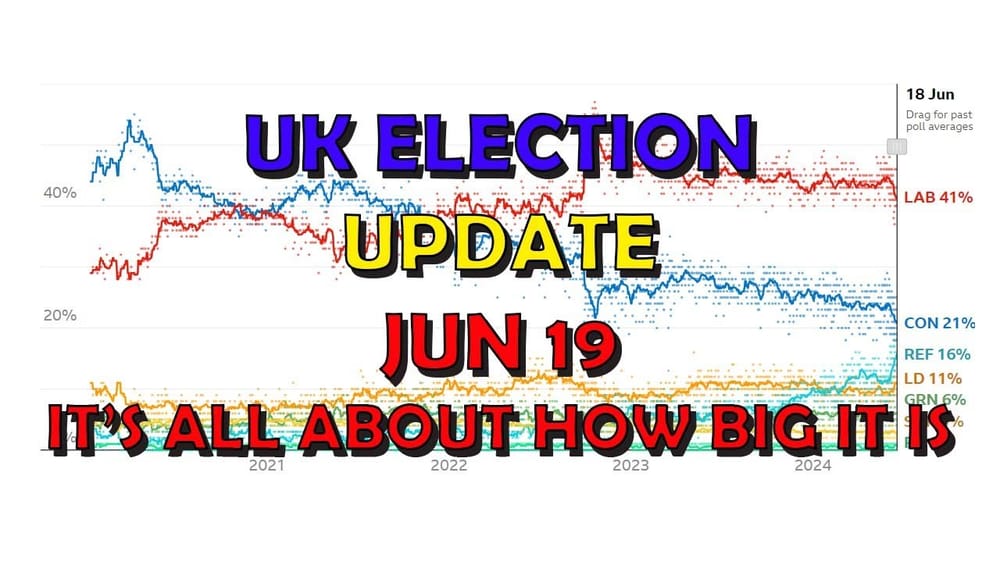UK Election Update - It's All About How Big It Is
Table of Contents 📖
"Labour getting in is not going to be a problem, but it's what you do after you get in for Labour that will be a massive problem because people want change."
Hello Team
🎦 00:00-00:40⏩
Jonathan welcomes viewers to an update on the upcoming UK election, reminding them of his previous detailed video explaining the UK electoral system.
Return to top⤴️
UK Inflation and Its Potential Impact
🎦 00:40-02:20⏩
- UK inflation has fallen to 2%, the lowest in the G7 (except for Italy), down from 11%. This is positive for the Conservative Party but might not significantly impact the election due to their current standing.
- While high inflation was previously attributed to global events, the Conservatives might struggle to claim credit for its decline.
Stagnant Polls and Labour's Predicted Victory
🎦 02:20-04:13⏩
- Recent polls show consistent support for Labour and Conservatives, with a slight dip for both and a minor rise for the Reform Party.
- The main discussion now revolves around the scale of Labour's likely win, rather than whether they'll win.
- Even Conservatives are campaigning on the basis of preventing a Labour supermajority, indicating their acceptance of a likely defeat.
- An Ipsos MRP poll (which analyses constituency-level voting patterns) predicts Labour could win 453 seats, with Conservatives securing only 115 - their worst defeat ever.
Labour's Shift to the Centre and Its Implications
🎦 04:13-06:54⏩
- Labour's substantial lead is partly due to dissatisfaction with 14 years of Conservative rule and their strategic move to the centre ground. - Previously considered left-wing, Labour's shift leaves the Green Party as the primary left-wing option.
- The Liberal Democrats, typically centre-left, have also leaned left in response to Labour's repositioning.
- The UK's "first-past-the-post" system disadvantages smaller parties like the Greens and Reform Party, who struggle to gain seats despite garnering significant votes.
- Labour needs a landslide victory to overcome vote splitting on the left.
- Return to top
- ⤴️
The Challenges of a Labour Victory
🎦 06:54-11:24⏩
- Jonathan draws parallels with the Biden-Trump election, noting that many voters were driven by opposition to Trump rather than enthusiasm for Biden.
- Similarly, many UK voters seem driven by a desire to remove the Conservatives, but it's unclear how many actively support Labour's current centrist platform.
- Jonathan speculates that Labour might be deliberately cautious due to concerns about limited government funds.
- Promising and delivering bold, expensive policies could be challenging and potentially backfire if they involve raising taxes.
- He suggests Labour might be aiming to secure power first and address the economic situation afterward. However, this strategy risks disappointing voters seeking immediate change.
The Rise of the Reform Party and Its Implications
🎦 11:24-13:49⏩
- The Reform Party, currently polling at 16%, highlights the flaws of the first-past-the-post system.
- Despite significant support, they are predicted to secure only 1-5 seats, illustrating the disparity between vote share and representation.
- Jonathan acknowledges this as a significant disadvantage, arguing that even parties he disagrees with deserve parliamentary representation.
- The Liberal Democrats face similar challenges, with their 11% vote share translating to potentially 38 seats.
- Jonathan advocates for proportional representation to address these imbalances.
The Uncertain Fate of Smaller Parties and Potential Seat Swings
🎦 13:49-17:43⏩
- The SNP (Scottish National Party), typically strong in Scotland, is projected to win 15 out of 48 seats, suggesting potential gains for Labour.
- The Greens might secure seats in areas like Bristol Central but are predicted to lose their Brighton Pavilion seat to Labour.
- Nigel Farage, aiming for a Reform Party win, is campaigning in Clacton, a constituency with a history of supporting UKIP (UK Independence Party).
- Despite a 16% national vote share, the Reform Party's geographically dispersed support limits their seat projections.
- Labour is expected to regain seats in their traditional heartlands in the North and Midlands.
Conservative Strategies and Potential Outcomes
🎦 17:43-25:11⏩
- The Conservatives are focusing their campaign efforts in their southern England strongholds, indicating concern about losing seats in these areas.
- Several prominent Conservative figures are at risk of losing their seats, highlighting the potential for a major upset.
- This raises questions about the future direction of the Conservative Party - will they return to moderate conservatism or shift further right?
- Jonathan cites analysis suggesting that centre-right parties that appease the far-right often fare worse than those that maintain a moderate stance.
- He speculates that a heavy defeat could lead to a merger between the Conservatives and the Reform Party, potentially pushing them further right.
- The election outcome remains uncertain, but it will likely significantly impact the UK's political landscape.
Wrap up
🎦 25:11-25:29⏩
Jonathan concludes the video, hoping viewers found the analysis useful and thanking them for watching.
Return to top⤴️




